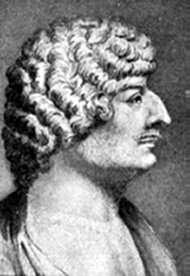|
 |
 |
 |
| Robert Herrick |
| ù�B�E����J |
| �Ϥ��ӷ��Ghttp://www.poets.org/poets/poets.cfm?prmID=201 |
| �D�n�����GPoem |
| ��ƴ��Ѫ̡GCecilia Liu/�B����;Julia Hsieh/�¨�� |
| ����r���GEnglish Literature I:the Seventeenth Century;English Literature and Culture From Medieval Period to the Eighteenth Century |
|
|
|
|
ù�B�D����J
1591-1674
|
| �@ |
|
 ���~�ͬ� ���~�ͬ�
A.
�a�x�I��
B.
�֤H���ϥ�
 ���~�ɴ� ���~�ɴ�
A.
���W
B. �X���ֶ�
�@
 �ߦ~ �ߦ~
|
| �@ |
 ���~�ͬ� ���~�ͬ� |
| �@ |
A.
�a
�x�I��
�@
1591�~8��
24��X�ͩ�۴���ù�B�D����J�]Robert Herrick�A��ٮ���J�^�A�ۤp�ͬ���I�Ϊ��a�x�����A���˥��i�Դ��D����J�]Nicholas
Herrick�^�����J�X�Ͳݦ~�K�Y�Ө��`�A������
���w�D����J�]Julian
Herrick�^�]�L�O�W�O���i�C�W�l�k�A�]�ӦV�˱��D�U�C�ѩ���������誺�˱��Ҭ��I�����ӤH�B�q�ƪ��K����~�A
����J�Ψ�S�̩n�f�������ˤͪ��оi�A�Y�K�O�u�@���w�ơC
�@
B.
��
�H���ϥ�
�@
����J�����~�Ш|���Ҧ����A����1607�~���᪺�Ш|�I�������ԲӪ��O���C�b�j�B
�·G�D����J��h�]Sir William
Herrick�^�����U�DzߧM���N�@�q�ɶ���A�~�ȤQ����������J�����o�{�ۤv���M�ܸr�˱��B�j�B�I���B���L�R���a��A�L������o���b�����I�өάO���K�C�]����
��J�H�G�Q�G�����~���i�J�C�����t�����ǰ|�NŪ�A��S�]�`���_���A��
���P�b�C�����T�X�@�ǰ|�NŪ�A�é�1617�~�o��Ǥh�Ǧ�A
1720�~������Ӥh�Ǧ�C����J�쥻�Dzߪk�ߡA��]����估�ͬ���•
�©_�h�]John
Wickes�^���v�T�A�먭��¾�u�@�C�b�C�����DzߥͲP�����A����J�P�B�̸ͭg�`���s�@�֡A���ɦۤv�Ч@���ֽg�C�]�]����
�@�֭��橹�����P��L�H�A�Ӥް_�`�ءC
�@
TOP
|
 ���~�ɴ� ���~�ɴ� |
| �@ |
A.
��
�W
�@
1623�~������¾�w��
��A����J�P�©_�h�K�@�P�q�ƶDZЪ��u�@�C�]���b�۴��A
����J���ˤ̸ͭg�`���E�@��Y�ܪ��֡A����J���ֽg���������z�S�ͬ��������ֽ�A�]�]���L���ֽg�e�{�˩M²��M�s������C�o�˪��֤�S��������J���֤�
�[�K�P�o�p�y�]Drayton�^�P�j��(Ben Jonson)���W�C
�@
�@
B.
�X
���ֶ�
�@
�[��O�ӾU������J�b1629�~�Q��
�������L�]Devonshire�^�A
�ȡA�@�}�l����J�L�k�A�����몺�m���ͬ��A���[�Ӥ[���A����m���۵M�����ίH�����P�ʡA�`�N���[��H�ƴ����A�ӿ����e�{���ֽg�����C�Q�~��A���M
����J�@�״��]�զ����}�u�@�^��ӥ��V�аϥD�и[���A�H�Ψp�ͤk�ö��ӱ����լd�A�L�٬O�X���F�ֶ�The
Severall Poems�C1647�~�A����J�]������d�����@�@�W�_�Y�O�ӳQ���h¾�A�^��۴��C���~�A�L���m�����ةԸ� �nHesperides�X���A�����y���F�ʡA����@�~�M�s���몺���欰���G�T�Q�~���ֶ���諸�D�n�����@�a���@�C
�@
TOP
|
 �ߦ~ �ߦ~ |
| �@ |
���d�����G�@��^�^��
�ɡA����J�����аϪA�ȡA���ۦ���1674�~�L�@�����A����J�K�H���A
�å��g�@�ΥX������ֶ��C |
| �@ |
| �@ |
�@ |
| �@ |
�@ |
�@ |
|
Robert Herrick
1591-1674
|
|
Provider: Julia Hsieh / �¨��
|
| �@ |
|
 Early
Life Early
Life
A.
Family Background
B.
Education
 Later
Life Later
Life
A.
A Servant to His Highness
B.
Writing Performance
 Last Years
Last Years
|
| �@ |
 Early
Life Early
Life |
| �@ |
A.
Family Background
Born on August
24, 1591, Robert Herrick was the fourth son in the seven children of
Nicholas Herrick and Julian Stone Herrick.
A year later Herrick's birth, Nicholas fell from a window of his
house and died.
Though
this accident was in a way suspected as a suicidal act, this
goldsmith and banker left his widow and children pretty much legacy
that had somehow promised the living quality of the Herrick family.
However, Widow Julian Herrick was not able to maintain the household
and turned to her relatives and her dead husband's relatives for
help.
The Herrick's
wealthy relatives who were possibly prominent merchants, goldsmiths
or of other professions did give a big hand in taking care of the
children; they not merely educated them but found them jobs.
B.
Education
The schooling of
Herrick before 1607 is a mystery.
What we know is that Herrick was an apprentice to Sir William
Herrick, his uncle who was a wealthy and prosperous goldsmith.
Nonetheless, the 16-year-old lad soon found out his real interest,
despite his admiration of the uncle's status and wealth.
Herrick entered St. John's at Cambridge first at the age of
twenty-two; then transferred to Trinity Hall, also at Cambridge, to
continue his study later.
The reason for his transferring may be to save the expenses.
Herrick received a B.A. degree in 1617, and his M. A. degree three
years after that.
From
his letters to his uncle, his revealed his active participation in
school life, circle of friends and also a faithful student of Henry
Peacham who wrote The Compleat Gentleman.
Herrick's much affected by his learning from his schoolmasters and
friends among who Clipseby Crew and John Wickes remained his
lifelong friends.
TOP
|
 Later
Life Later
Life |
| �@ |
A.
A Servant to His Highness
It was possibly
Wickes' influence, in the spring of 1623, Herrick decided to answer
Bishop Dove of Peterborough's appointment of a curate, and hence
began his career of priest.
Before he joined the expedition led by Duke of Buckingham, Herrick
enjoyed his life fully with his friends in London.
In many of Herrick's poetry, the merriment and pleasure of feasting,
drinking, singing and sharing poetry that composed by Herrick
himself and his clergymen friends were prominent features and main
themes.
And before
long, Herrick's name appeared parallel to other famous poets of his
time, such as Ben Jonson, Drayton, and etc.
In 1629, Herrick received the job of being a vicar in the west of
the country.
On his
first long living abroad, Herrick firstly seemed to be unable to
adjust into the rural village in Devonshire.
But soon he opened up to the beauty of the view of countryside and
country life.
For ten
years, Herrick stayed in Devonshire and made use of the inspiration
out of the nature and small things in composing his poems.
It was ten years later that Herrick left for London for getting his
poems published.
This
incident eventually caught him in trouble for his leaving his parish
without the permission of his bishop.
B.
Writing Performance
Despite of an
investigation of his departure without application and an
illegitimate child by Tomasin, Herrick not only had his
The
Severall Poems published but was found not guilty.
When the war between King Charles and the Parliamentarians and
Puritans broke out in 1642, Herrick was out of the center of the
storm and continued to live his life and composing poems in the
country.
Though later
his loyalty to the king caused his lost of his position of a priest
in 1647, Herrick returned to London and had his poems printed out,
again, one year later.
In Hesperides, Herrick included 1400 poems.
This might be the last that the poet published and composed.
�@
TOP
|
 Last
Years Last
Years |
| �@ |
After Hesperides, there was hardly any evidence showing the
poet involving in active poetry writing.
As to his job, Herrick had been restored to his old position at Dean
Prior as a vicar when King Charles II returned to England.
From then to his death in 1674, Herrick was not known for any
eminent poetry but some epitaph.
To his ripe age at eighty three, Herrick left the world his
particular interesting writing technique of short, clear, observant
and vivid poems.
TOP
|
|
Reference
|
|
Rollin, Roger B.
Robert
Herrick.
New York:
Twayne Publishers, 1966.
MaxPatrick, F.
Ed.
The Complete Poetry of Robert Herrick.
New York: The Norton Library, 1968.
Ishii, Shonosuke.
The Poetry of Robert Herrick.
Tokyo: The Renaissance Institute, 1974.
|
| �@ |
�@ |
�@ |
| �@ |
�@ |
�@ |
|
|
|
|
